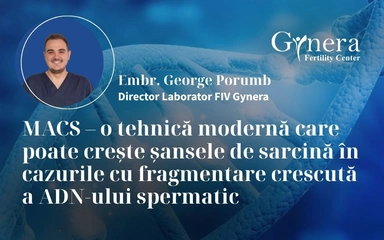Male fertility is not a label, but a signal of health and the power to build the future
Dr. Anca Coricovac Senior Obstetrician-Gynecologist, Infertility and IVF Specialist Medical Director, Gynera

“Caring for your fertility means caring for your health today and the future of your family tomorrow.”
“Male fertility is not a label—it’s a signal of your health and your ability to shape the future.” —
Dr. Anca Coricovac, Medical Director
When we talk about infertility, the conversation often focuses on women. However, the reality is that 1 in 3 infertility cases in couples are due to male factors, and this proportion continues to rise.
Male fertility is not only about the ability to conceive. It is also a significant indicator of general health and longevity. Just as there are specialists for women’s reproductive health, the urologist is the male equivalent of a gynecologis, a physician who can detect hidden problems early through a simple exam and a semen analysis and recommend appropriate treatment.
Recent studies highlight how sperm DNA fragmentation, oxidative stress, paternal age, and epigenetics directly affect embryo health, pregnancy chances, and even the father’s life expectancy. It has also been shown that men with a normal semen analysis live, on average, almost 3 years longer than those with severely altered parameters. This is the true gain: early detection and correction.
Ten truths about male fertility we should all be aware of:
1. Semen analysis is a simple yet powerful test reflecting not only fertility but also overall health.
2. Sperm carry more than chromosomes – they provide essential structures and information for embryo development.
3. Varicocele and oxidative stress are common yet treatable medical causes.
4. ICSI solves fertilization but does not repair DNA damage – male causes must be diagnosed and treated.
5. Paternal age matters – over 40, DNA fragmentation and miscarriage risks increase.
6. Miscarriage is not a personal failure – it is often linked to genetic or epigenetic sperm factors.
7. Lifestyle habits (smoking, alcohol, poor diet, inactivity) affect both fertility and the child’s health.
8. Epigenetics proves that sperm-borne data impact the long-term health of the child.
9. Testicular biopsy (TESE) can retrieve viable sperm even in severe infertility cases.
10. Fertility reflects longevity – a healthy semen analysis can add years to a man’s life.
Male infertility is not a dead end, but an opportunity to uncover and treat hidden issues. A visit to the urologist and a simple semen analysis can offer more than the chance to become a father—it could be the key to a longer, healthier life.
With care and responsibility,
Dr. Anca Coricovac
Medical Director, Gynera Clinic



